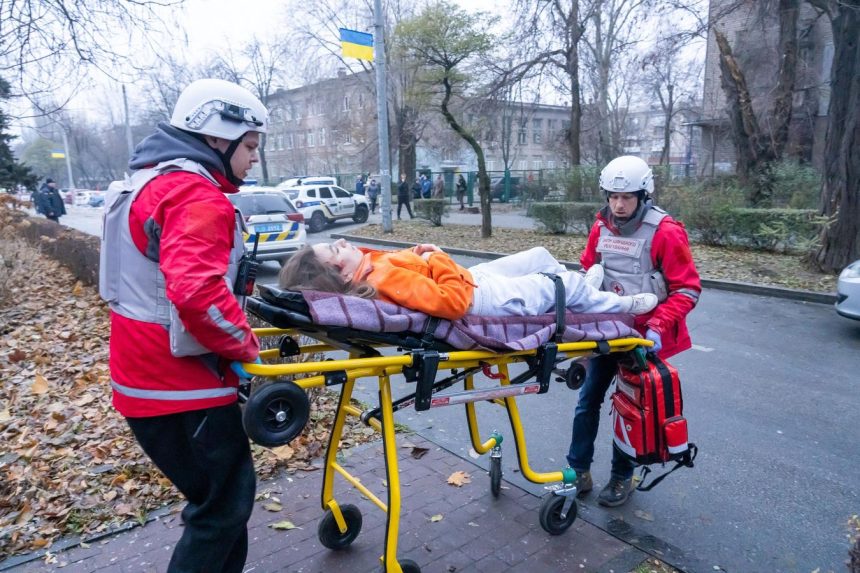Escalating Conflict and Humanitarian Crisis:
The war in Ukraine continues to inflict a devastating toll on civilians, with recent attacks reaching new levels of brutality. A Russian ballistic missile strike on a private medical facility in Zaporizhzhia killed at least eleven people, marking the deadliest attack in recent months. This horrific incident follows another attack just days earlier that claimed the lives of ten civilians. These attacks underscore the indiscriminate nature of the violence and the ongoing threat to civilian populations. The targeting of medical facilities is a particularly egregious violation of international humanitarian law, depriving vulnerable populations of essential care and exacerbating the already dire humanitarian situation. Alongside the immediate loss of life, these attacks inflict long-term trauma on communities and further destabilize an already fragile region. The ongoing shelling in Kherson adds to the mounting civilian casualties, highlighting the urgent need for a cessation of hostilities and a peaceful resolution. Amidst this backdrop of violence, President Zelenskyy’s visits to front-line troops and a critical underground surgical unit serve as a powerful symbol of resilience and a testament to the dedication of Ukrainian forces and medical personnel. The revelation of the execution-style murders of over 100 Ukrainian prisoners of war in 2024 alone further underscores the brutality of the conflict and the urgent need for accountability. The documented cases of systematic abuse and violations of international humanitarian law demand international attention and action to ensure the protection of prisoners of war and prevent further atrocities.
International Support and Ukraine’s Economic Resilience:
Despite the ongoing conflict, Ukraine has demonstrated remarkable resilience, both militarily and economically. Canada’s substantial military aid package, totaling nearly $600 million, provides a crucial boost to Ukraine’s defense capabilities. This aid bolsters ammunition supplies, provides critical training, and supports mine-clearing efforts. Canada’s continued support, exceeding $4.5 billion since the full-scale invasion, reflects the international community’s commitment to assisting Ukraine in its fight for sovereignty. Finance Minister Serhiy Marchenko’s assertion that Ukraine possesses sufficient resources to sustain its defense until mid-2025, even without U.S. aid, underscores the country’s determination to maintain its defense posture. While acknowledging the potential challenges of losing U.S. support, Marchenko emphasized the importance of building strong relationships with the new U.S. administration. This proactive approach highlights Ukraine’s commitment to securing its long-term security and stability.
The European Union’s 15th sanctions package against Russia further strengthens the international pressure on the Kremlin. Targeting entities within Russia and third-party nations that facilitate the circumvention of restrictions, the sanctions aim to disrupt Russia’s military capabilities and technological advancements. The inclusion of Chinese companies and tankers linked to Russia’s attempts to bypass oil price caps demonstrates the EU’s resolve to hold those supporting Russia’s hostile policies accountable. These sanctions aim to constrain Russia’s ability to wage war and exert pressure on the Kremlin to seek a peaceful resolution. The broad scope of the sanctions underscores the international community’s commitment to isolating Russia and preventing further escalation of the conflict.
Political Challenges and Economic Impacts:
The upcoming U.S. presidential election introduces potential uncertainties regarding the future of U.S. support for Ukraine. President-elect Trump’s expressed opposition to providing long-range missiles capable of striking within Russian territory raises concerns about a potential shift in U.S. policy. While affirming his commitment to supporting Ukraine, Trump’s emphasis on using aid as leverage for negotiations could limit Ukraine’s military options and potentially prolong the conflict. This stance contrasts with the current administration’s approach and raises questions about the long-term implications for Ukraine’s defense strategy and its pursuit of NATO membership.
Ukraine’s economic stability faces ongoing challenges, with inflation exceeding projections and energy deficits persisting. The National Bank of Ukraine’s decision to raise the key interest rate reflects the urgency of addressing inflationary pressures exacerbated by the ongoing conflict. The unpredictable nature of Russian missile strikes on energy infrastructure further complicates the situation, making accurate forecasts of electricity supply shortfalls difficult. The central bank’s efforts to curb inflation, coupled with a $50 billion agreement involving frozen Russian assets, aim to stabilize the economy and mitigate the impact of the war.
The possibility of western troops serving as peacekeepers in Ukraine remains a complex and sensitive issue. While President Zelenskyy has expressed openness to the idea, Poland’s current opposition underscores the lack of consensus among potential peacekeeping forces. The presence of western peacekeepers would likely require a cessation of hostilities and the consent of both Russia and Ukraine, presenting significant diplomatic hurdles. The absence of reports regarding Russia’s views on this matter further highlights the challenges in achieving a peaceful resolution and the complexities of deploying international peacekeeping forces.
Russia’s Economic Strain and Energy Deals:
Russia’s economy is grappling with the mounting costs of the war in Ukraine, with defense spending projected to surge in the coming years. Despite record military expenditures, economic growth has stagnated under the weight of Western sanctions, labor shortages, and high inflation. The arms industry faces challenges in sustaining production due to aging stockpiles and sanctions on critical imports, while soaring recruitment costs underscore the difficulties in replacing front-line losses. Declining oil revenues further strain the Russian economy, forcing the government to implement new taxes and spending cuts in an attempt to stabilize finances. The combination of high interest rates and sanctions puts the Russian economy at risk of stagflation or recession, increasing its vulnerability to external shocks.
Russia’s burgeoning energy relationship with India offers a potential lifeline amidst Western sanctions. The historic trade deal with Reliance, involving the delivery of nearly 500,000 barrels of oil per day, represents the largest energy contract between the two nations. This decade-long agreement strengthens energy ties and provides Russia with a significant market for its oil exports. India’s emergence as the largest buyer of Russian oil since the EU reduced imports underscores the shifting global energy landscape and Russia’s increasing reliance on non-Western partners. This agreement provides Russia with a vital source of revenue and strengthens its strategic relationship with India in the face of international pressure.
The Path Forward:
The ongoing war in Ukraine presents a complex and evolving situation with significant implications for global security and stability. The humanitarian crisis continues to worsen, demanding urgent international attention and assistance. Ukraine’s resilience and determination to defend its sovereignty remain steadfast, bolstered by international support and economic resourcefulness. However, political uncertainties, particularly regarding the future of U.S. aid, could impact the course of the conflict. Russia’s economic vulnerabilities, exacerbated by the war, create further instability and uncertainty. The evolving energy partnerships and geopolitical shifts underscore the complex interplay of factors shaping the conflict and its potential long-term consequences. The path to a peaceful resolution remains challenging, requiring sustained diplomatic efforts and a commitment to de-escalation from all parties involved.



